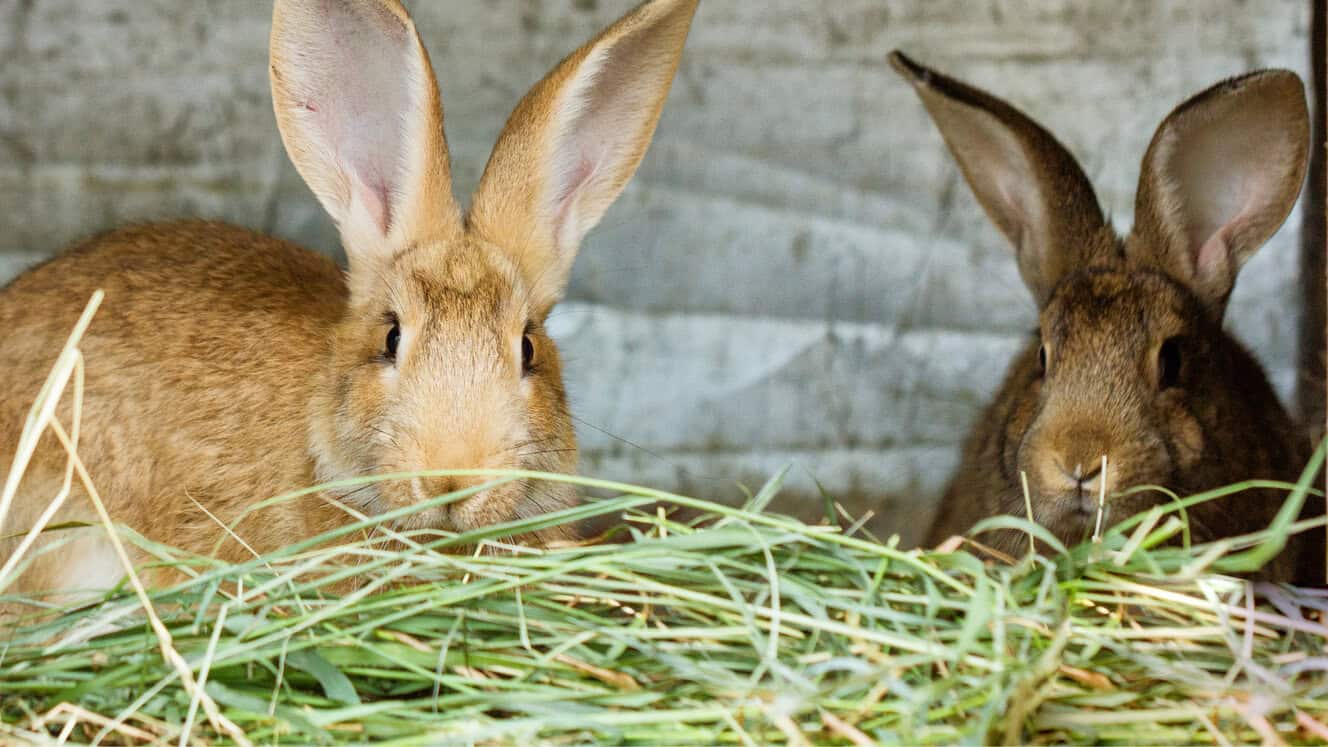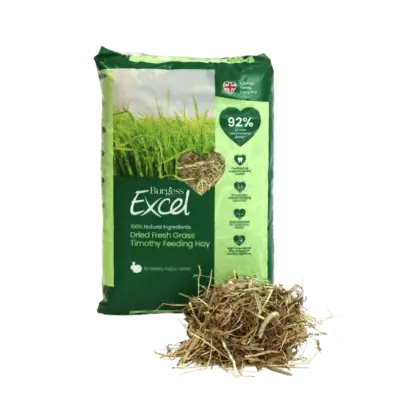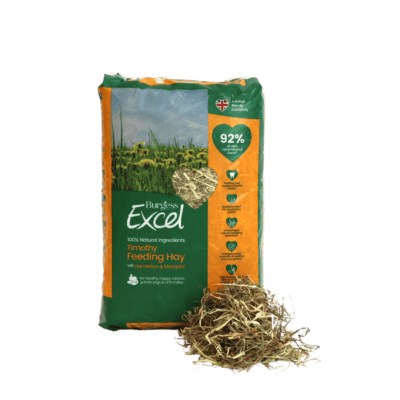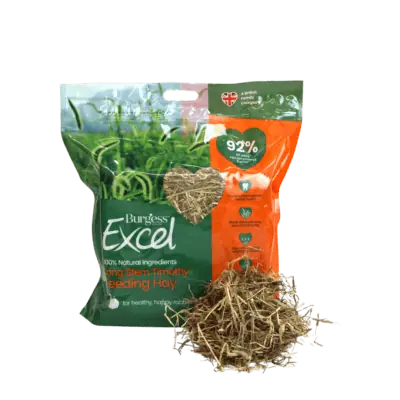
Whether your small pet crew consists of rabbits, guinea pigs, chinchillas or degus, one of their favourite things to do is to chow down on some tasty, sweet smelling feeding hay. In fact, hay should make up the majority of their diet and, when it comes to safeguarding their health and wellbeing, it’s an essential.
However, not any old hay will do. To keep your discerning dry grass nibblers happy and healthy, it has to be high quality feeding hay that’s been especially grown for eating.
DID YOU KNOW? According to Burgess Pet Care’ recent Small Animal Census – which surveyed 6,514 owners and 20,915 small animals – almost a quarter of small pet owners – 24% – aren’t aware that there’s a difference between feeding and bedding hay.
Burgess in-house vet, Dr Suzanne Moyes MVB, MRCVS, explains: “While bedding hay is fine for sleeping on, it’s likely to have poor nutritional value and really doesn’t make good eating. For rabbits, guinea pigs, chinchillas and degus to be healthy, it’s vital that you choose hay that’s specially grown for small animals to feed on, cut at the right time to capture all the natural goodness, so your small pets enjoy eating it.”
What’s the best bedding for different small pets? >>
A body-sized bundle of hay a day!
In fact, around 85-90% of a rabbit or guinea pig diet should be high quality feeding hay and grazed grass. Astonishingly, that’s equal to their own body size in hay every day!
Dr Moyes adds: “High quality feeding hay provides a whole host of benefits for small furries. It’s an excellent source of fibre, helps to maintain a healthy gut and serves to grind down their continuously growing teeth, helping prevent dental disease.”
DID YOU KNOW? Rabbits, guinea pigs, chinchillas and degus need to keep their digestive systems busy with a mix of two kinds of fibre moving through the gut at all times. These types of fibre are called digestible fibre and indigestible fibre. They get this fibre mainly from good quality feeding hay.
The best quality feeding hay is also naturally barn-dried, and has any dust extracted. Dr Moyes advises: “Guinea pigs in particular are severely affected by dust and dusty hay can cause serious respiratory problems. Always look for high quality hay which states that it’s ‘dust extracted’, to protect your guinea pigs’ respiratory health.”
Because it’s so important to know the difference between bedding hay and feeding hay, here’s a useful summary of what to look out for.
Bedding hay is only suitable for small pets to sleep on and can be:
- Cheaply manufactured
- Of unknown nutritional value
- Less tasty
- Yellow or brown in colour and dusty
Feeding hay is grown specially for eating and is:
- Fresh and fragrant, barn dried and dust extracted
- Much more tasty
- Nutritionally rich and laboratory tested
- High in fibre for gut health
DID YOU KNOW? Most of the medical and surgical problems that occur in pet rabbits, guinea pigs, chinchillas and degus – such as dental, gut, eye, behavioural, urinary, weight and skin problems – are due to poor nutrition and could be prevented with an improved diet, including fresh and tasty high quality feeding hay.
Check out all the benefits of choosing high-quality feeding hay for your small furries to enjoy
- HAY PROVIDES VITAL FIBRE Top quality feeding hay is an excellent source of fibre and plays a vital part in digestion for rabbits, guinea pigs, chinchillas and degus.
- HAY IS GREAT FOR KEEPING TEETH IN GOOD SHAPE Munching on delicious hay also keeps continuously growing teeth in check, helping to prevent dental disease.
- HAY HELPS PROMOTE OVERALL HEALTH Feeding plenty of high-quality feeding hay, some grass-based nuggets and a few fresh greens will help your rabbits, guinea pigs, chinchillas and degus maintain healthy skin, coat, eyes, teeth and digestion.
At Burgess Pet Care, we take our hay very seriously indeed...
- We have a long tradition of supporting British farmers. As part of our ongoing commitment, we actively source our ingredients as close to our Yorkshire mill as possible.
- The grass used in our nutritious Excel nuggets for rabbits, guinea pigs and chinchillas and degus is sourced from the UK to meet our stringent specifications and we know exactly which field each batch comes from and the date it was harvested. It’s also exclusive to Burgess. No other pet food manufacturer has access to our grass!
- The grass is harvested when it’s at its lushest to ensure the optimum level of nutrients and fibre, helping to ensure that it delivers all the goodness pet animals require.
- Our grass is grown on an estate that works in partnership with the local wildlife trust and ensures that the grassland is managed to reduce environmental impact and positively encourage biodiversity.
92% OF UK VETS RECOMMEND OUR BURGESS EXCEL SMALL PETS RANGE!
*****With a whole host of five-star reviews, Burgess Excel customers who have purchased our hay have told us: * “Great quality, smells amazing!” * “Excellent quality hay for a very reasonable price. The hay is green and healthy, it smells great, and the strands are long and thick. My rabbit absolutely loves it.” * “Great product. The bunnies loved it!! Big hit.” * “Such fresh smelling hay and beautifully green in colour. My rabbits get so excited when I'm giving them the feeding hay and it’s so beneficial for them.” * “Our guinea pigs love this hay!” *
Check out the Burgess Excel feeding hay range of boxes, bags and bundles! >>
SERVE UP ONLY THE VERY BEST DINNER FOR YOUR SMALL PETS
Our small pets deserve a high-quality diet that’s created just for them. At Burgess, all our foods for small pets is made at our factory in the heart of Yorkshire, using only ingredients that meet our stringent specifications. We have also launched many innovations. These include the world’s first food specifically formulated for indoor rabbits and the world’s first indoor guinea pig nuggets which are made with a calm formula.
Also check out our selection of yummy, nutritious treats that your small pets will love!
Are your small pets Burgess small pets? Join the Burgess Pet Club for exclusive offers and rewards.
LET’S GET SOCIAL! Sign up to the Excel Bunny Base or become part of theExcel Squeak Squad on Facebook. Find lots ofadvice and friendly discussions from likeminded owners – and there are lots of cute bunny and piggy photos and videos! Also join us on Instagram.
CARE MORE Find lots of useful advice on caring for all your pets from Burgess, the pet experts. Training, nutrition, grooming and general care. It’s all here >>
If you found this interesting, you may also like:
WHAT’S ON THE MENU FOR THE MORE MATURE GUINEA PIG? Guinea pigs are living longer – yay! And if you have an older guinea pig, you’ll be delighted to hear that the experts at Burgess Pet Care have developed a brand-new variety of food just for them!
WHAT’S IN SEASON? HOW TO CHOOSE SAFE FRESH FOOD FOR YOUR SMALL PETS What better way to add variety to your small pets’ daily dinners than by selecting safe fruits, vegetables and leafy greens to nibble on. To save a few pennies, you could even forage for some tasty titbits yourself or why not grow your own?
THE SECRET TO HEALTHY, HAPPY GUINEA PIGS In order to help your guinea pigs live their best lives, it helps to see things from their perspective.
WHAT DO RABBITS, REALLY REALLY WANT? Ever wished you could speak rabbit, so you understand exactly what your bunny buddies require to be happy and healthy? If our pet rabbits could speak human, here are 8 things they’d tell us!
THE ULTIMATE GUIDE TO HAPPY, CHILLED CHINCHILLAS Famed for their soft, dense fur and gentle nature, chinchillas make fascinating pets, providing you understand what's involved in caring for these timid, highly active animals.
THE ULTIMATE GUIDE TO HAPPY, HEALTHY DEGUS A close relative of the chinchilla, the degu is a gentle South American rodent that’s native to northern and central Chile. Looking rather like an oversized gerbil, degus have silky, grey-brown coats, rounded ears, a long, thin tail with a tufted, black tip and bristly hair on their hindfeet.
FEEDING YOUR GUINEA PIGS – WHY THEY DON’T NEED LIFE STAGE FOOD Unlike puppies, kittens and baby rabbits, baby guinea pigs are born fully formed and eat solid food almost straight away. So, what do they need from their diet?
21 AMAZING RABBIT FACTS FOR BUNNY FANATICS Even if you’re a lifelong bunny lover, there are a few things you may not know about your hay-chomping chums. Start off 2021 with browsing our fascinating selection of pet rabbit facts...
LITTER TRAINING YOUR RABBITS Whether your buns live indoors or out, litter training has lots of benefits – both for them and you!
BONDING WITH YOUR BUNNY CHUMS It’s no surprise that rabbits who bond with their owners live longer and happier lives. Find out how to deepen your connection with your nose-twitching pals.
HOW DO YOU GROOM RABBITS? Keeping clean and neat is very important to rabbits and, just like cats, buns spend a huge amount of time grooming themselves. They also need a little help from us.
HOW TO GROOM YOUR GUINEA PIGS From the brush and browse, ear clean, dental check and nail trim to the grease gland wipe, discover more about the essentials of guinea pig grooming.
LOST IN TRANSLATION? GUINEA PIG SPEAK EXPLAINED Guinea pigs are sociable, chatty creatures who generally have plenty to say. Getting to know what the various piggy sounds means will help you understand your pets better and identify when they’re happy and excited or fearful and unwell.
RABBITS AND GUINEA PIGS – IS INDOORS OR OUTDOORS BEST? Is the outdoor life better for bunnies and guinea pigs, or will these small pets have a more enriching time if they’re kept indoors?
HOW DO YOU CREATE AN IDEAL HOME FOR YOUR INDOOR GUINEA PIGS? Traditionally thought of as outdoor pets, more and more people prefer to keep their guinea pig friends indoors – and there are lots of good reasons why. Yet, however cosy and stylish your indoor piggies’ home is, it also needs to meet all their health and wellbeing requirements.
HOW MUCH SPACE DO YOUR RABBITS NEED? If you have a couple, a throuple or even a band of well-bonded bunnies, you’ll know just how much they love hanging out together. However, even the best bunny pals need their own space.
HOW TO PROTECT YOUR GUINEAS AND BUNNIES FROM PESKY PARASITES When it comes to protecting our gorgeous small pets from mites, fleas, flies, ticks and mosquitoes – and any other irritating and unwelcome pests – a four-pronged attack is the best approach.
ESSENTIAL HEALTH CHECKS FOR SMALL PETS Our small pets such as guinea pigs, chinchillas, rats, gerbils, hamsters and degus need us to keep a constant close eye on their health and wellbeing. But do you know what to look for?
FINDING A VET FOR YOUR SMALL PETS Did you know that just like hospital specialists, vets have different areas of expertise? That’s why, if you have small pets, it can be a good idea to seek out a vet that specialises in small animal medicine.
COST EFFECTIVE WAYS TO LOOK AFTER YOUR SMALL PETS How to create DIY boredom breakers and ways to upcycle old furniture and unwanted items from around the house into interesting features for your pets’ environment.

















